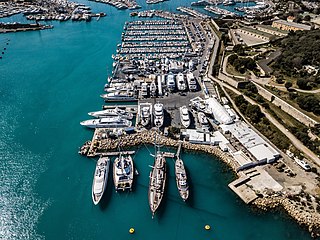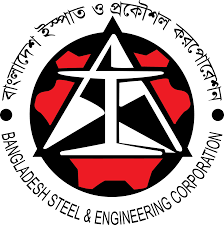
A shipyard, also called a dockyard or boatyard, is a place where ships are built and repaired. These can be yachts, military vessels, cruise liners or other cargo or passenger ships. Compared to shipyards, which are sometimes more involved with original construction, dockyards are sometimes more linked with maintenance and basing activities. The terms are routinely used interchangeably, in part because the evolution of dockyards and shipyards has often caused them to change or merge roles.

A patrol boat is a relatively small naval vessel generally designed for coastal defence, border security, or law enforcement. There are many designs for patrol boats, and they generally range in size. They may be operated by a nation's navy, coast guard, police, or customs, and may be intended for marine, estuarine, or river environments.

The Bangladesh Navy is the naval warfare branch of the Bangladesh Armed Forces, responsible for Bangladesh's 118,813 square kilometres (45,874 sq mi) of maritime territorial area, and the defence of important harbours, military bases and economic zones. The primary role of the Bangladesh Navy is to protect the country's economic and military interests at home and abroad. The Bangladesh navy is also a front line disaster management force in Bangladesh, and participates in humanitarian missions abroad. It is a key regional player in counter terrorism efforts, and engages in global peacekeeping with the United Nations.
Toronto Drydock Company is a shipbuilding repair company in Canada and the name of two shipbuilders in the 19th and 20th centuries respectively.

French Navy modernization is pursued on the basis of successive Projet de loi de programmation militaire. These defence modernization plans are formulated on a rolling basis pursuant to strategic, political and budgetary factors and pressures. The latest LPM covers the period 2024 to 2030 and is organized around four strategic priorities: strengthening deterrence, preparation for high intensity operations, protecting interests in all French territories and key domains and strengthening international partnerships.

Mazagon Dock Shipbuilders Limited (MDL), formerly called Mazagon Dock Limited, is a shipyard situated in Mazagaon, Mumbai. It manufactures warships and submarines for the Indian Navy and offshore platforms and associated support vessels for offshore oil drilling. It also builds tankers, cargo bulk carriers, passenger ships and ferries.

Hall, Russell & Company, Limited was a shipbuilder based in Aberdeen, Scotland.

The Holland-class ocean-going patrol vessels are a class of four ocean-going patrol vessels constructed for the Royal Netherlands Navy. They are designed to fulfill patrol and intervention tasks against lightly armed opponents, such as pirates and smugglers, but have much higher level electronic and radar surveillance capabilities which are used for military stabilization and security roles, short of outright war. Without sonar or long range weapons, they utilize the surveillance capabilities of the Thales integrated mast, which integrates communication systems and two 4-faced phased arrays for air and surface search.

The Gowind design is a family of steel monohull frigates, corvettes and offshore patrol vessels developed since 2006 by France's Naval Group, formerly known as DCNS, to conduct missions in the littoral zone such as anti-submarine warfare (ASW). The Gowind family includes vessels with lengths from 85 to 111 metres and displacement from 1,000 tons to 3,100 tons.
The Khulna Shipyard Limited(Bengali: খুলনা শিপইয়ার্ড লিমিটেড) is a Bangladeshi state owned defense contractor based in Khulna, Bangladesh. It is located on 68.97 acres of land at Labanchara, Khulna, Bangladesh. It is about 45 km north from the Port of Mongla. The shipyard has the capacity to build steel / aluminium ships up to 90 m length and 700 tons lightweight. The shipyard has a slipway with a capacity to dock and undock vessels up to 700 tons lightweight and overall length of 84 meters.

The Saryu class of offshore patrol vessels (OPV) are advanced patrol ships of the Indian Navy built at the Goa Shipyard Limited. These vessels are capable of ocean surveillance and monitoring and can maintain control of shipping lanes. They can also be deployed to provide security to offshore oil installations, and other naval assets.

BNS Shaheed Ruhul Amin was an Island-class offshore patrol vessel of the Bangladesh Navy used as a training ship. She was built and served as a Royal Navy Island-class patrol vessel HMS Jersey (P295) from 1977 to 1993.
Reliance Naval and Engineering Limited (R-Naval), formerly known as Reliance Defence & Engineering Limited and prior to that as Pipavav Shipyard Limited and Pipavav Defence & Offshore Engineering Company Limited is an Indian shipbuilding and heavy industry company headquartered in Mumbai. The shipyard is located in Pipavav, Gujarat, at a distance of 90 km South of Amreli, 15 km South of Rajula and 140 km South West of Bhavnagar. R-Naval is the first private sector company in India to obtain a license and contract to build warships. Pipavav is the largest shipyard in India.

The Arafura class is a class of offshore patrol vessels being built for the Royal Australian Navy (RAN). Initially proposed in the 2009 Defence White Paper and marked as procurement project SEA 1180, it was originally planned that 20 Offshore Combatant Vessels (OCV) would replace 26 vessels across four separate ship classes: the Armidale-class patrol boats, the Huon-class minehunters, the Leeuwin-class survey vessels, and the Paluma-class survey motor launches. Although having a common design, the ships would use a modular mission payload system to fulfill specific roles; primarily border patrol, mine warfare, and hydrographic survey. The 2013 Defence White Paper committed to the OCV project as a long-term goal, but opted in the short term for an accelerated procurement of an existing design to replace the Armidales, and life-extension refits for the other types. This resulted in the Offshore Patrol Vessel (OPV) project and the amount of vessels reduced to 12. However, this was further increased to 14 when 2 further Mine Counter Measures variants were proposed under SEA 1905.

is a military modernization program of the which Began in 2009 and revised in 2017, designed to the capabilities of the three services of the Bangladesh armed forces: the Army, the Navy and the Air Force. The primary focus of the modernization program is the reformation of the military organization, expansion of the forces, the transformation of the indigenous defense sector to support research and manufacturing, and acquisition of modern military weapons. The requirement for modernization was realized in the aftermath of 2008 Bangladesh–Myanmar naval standoff later resulting in Bangladesh's favour. One of the primary objectives of the modernization program is to develop a three-dimensional force capable of conducting multi-platform warfare.

Bangladesh Steel and Engineering Corporation or BSEC, is a government owned corporation in Bangladesh.

The Astilleros y Maestranzas de la Armada(English: Shipyards and Maestranzas of the Navy), better known by the acronym ASMAR, is a Chilean state-owned shipbuilding company with autonomous administration, which provides services to the Chilean Navy, mainly, and also to other domestic and foreign customers. Its predecessor was Arsenales de Marina, created in 1895, until it was restructured and adopted its current name on April 6, 1960.
Bangladesh Navy frigate program is a planned project of building 6 multi-role stealth guided missile frigate for Bangladesh Navy. In 2017, plan for the frigate project under the Forces Goal 2030 officially announced. Bangladesh Navy is inspecting proposals from several companies to evolve their designs into a prospective design for the proposed six guided-missile frigates.

Arsenal do Alfeite, SA is a company with an area of 36 hectares of implantation included in the Lisbon Naval Base. It is mainly dedicated to satisfying the needs of shipbuilding, maintenance, modernization and repair of the Portuguese Navy, other NATO and commercial navies, using advanced technologies, namely in the areas of electronics, optronics, armament, mechanics and electrical engineering. Alfeite's arsenal has already built more than 150 boats. Arsenal do Alfeite has a close relationship with Royal Moroccan Navy, repairing and modernizing ships since 2012.















